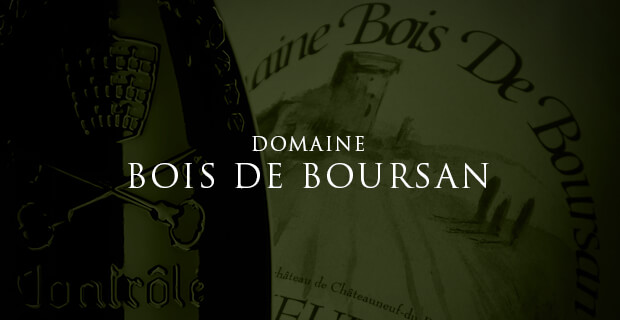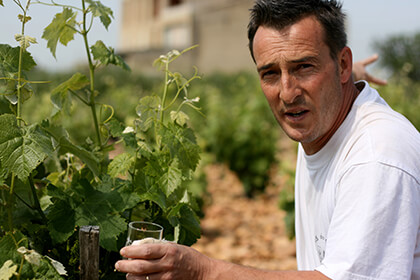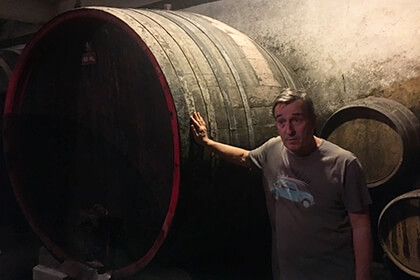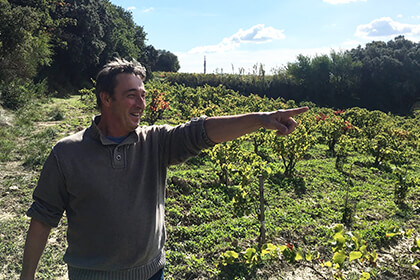
Domaine Bois de Boursan Wines
Wine lovers seeking classic Chateauneuf-du-Pape at an excellent value for money need look no further than the Bois de Boursan range, produced by Jean Paul Versino. This concise collection of just...Read More
Bois de Boursan | Great Value Wines of Chateauneuf-du-Pape
Wine lovers seeking classic Chateauneuf-du-Pape at an excellent value for money need look no further than the Bois de Boursan range, produced by Jean Paul Versino. This concise collection of just three bottlings comes from blending 13 of the appellation’s flagship grape varieties, grown on the very old vines that inhabit the estate’s 27 small plots, measuring 25 acres in total. Certified organic viticulture is coupled with very traditional winemaking to produce wines that pour forth the essence of this historic appellation.

The reds pour forth explosive aromas of black plum and macerated mulberries, roasted meat, smoked earth and dark chocolate, along with the sun-soaked, dried herb and garrigue nuances typical of the Southern Rhone. These are complemented by their very ripe and sunny Chateauneuf-du-Pape white, with a remarkably intense bouquet of baked peaches, pineapple and sunflower petals.
The History of Domaine Bois de Boursan
This family winery, situated in the Chateauneuf-du-Pape appellation of the southern Rhone Valley, was first established by Jean Versino at the beginning of the 1950’s. This followed a move by the Versino family from the Italian winemaking region of Piedmont to France. In its early days, the estate produced wine in bulk to sell directly to wine merchants.
Eventually Jean’s son Jean Paul Versino joined the family business and the father-son team began bottling wines on the estate around the 1980’s. Together, they gradually expanded their land holdings with the strategic purchase of various plots in Chateauneuf-du-Pape. Nowadays, the vineyards expand over 10 hectares (25 acres) in 27 different terroirs of the Chateauneuf-du-Pape appellation. Jean Paul Versino took over the management of the estate with the remarkable 1990 vintage and immediately decided to convert to organic viticulture. Today the vineyards are certified organic by Ecocert.
The Terroir of this Chateauneuf-du-Pape Estate
Today, this family estate covers 10 hectares (25 acres) divided into 27 different plots, all within the appellation and village of Châteauneuf-du-Pape. These plots are characterized by a mix of orientations (with some south, north, east and west-facing slopes). They are home to a mosaic of different soil types, including the iconic rounded pebbles of the Chateauneuf-du-Pape appellation, along with clay, sandstone, sand and limestone (which lends a richness and complexity to the wines of the estate). Overall, the vineyards are made up of either river stones over a limestone-clay subsoil or sandy soils.

Jean Paul cultivates all 13 grape varieties permitted in Cheteauneuf-du-Pape: Grenache, Syrah, Mourvedre, Cinsault, Clairette, Bourboulenc, Vaccarese, Counoise, Roussanne, Muscardin, Grenache Blanc, Picpoul (or Piquepoul) and Terret. These vines are quite old, aged 50 years on average and ranging from 25 to 115 years of age. This means a naturally low yield of highly concentrated fruit each year. They are trained in Gobelet and planted at densities of 3,000-4,000 vines per hectare. The vineyard team keeps a close eye on yield, further reducing it (as needed) with severe winter pruning as well as debudding in the spring. The soil is ploughed annually to maintain the health of the vineyard.
The vineyards of the property are certified organic by Ecocert. Jean Paul has completely ruled out the use of harmful phytosanitary products and chemical pesticides. The Mistral wind is a natural ally to the viticultural team, keeping the vineyards dry and healthy.
Winemaking at this Chateauneuf-du-Pape Estate
The grapes are harvested entirely by hand into small cagettes (which help the fruit remain intact), typically between mid-September and early October. The fruit is typically not destemmed, although for certain cuvées in certain vintages, they may destem a small portion of them. The grapes are transferred into cement or stainless steel vats, where they begin alcoholic fermentation spontaneously.

They are then pressed in a vertical basket press and filled into large oak barrels, where they finish the fermentation process. Following fermentation, the wines are blended and aged for a period of 24 months in a variety of different barrel types. Their Chateauneuf-du-Pape red “Tradition” ages for 24 months in neutral oak foudres, while the white ages in enamel tanks and is placed in bottle 6 months after its harvest in order to maintain its freshness. The estate’s flagship cuvée Chateauneuf-du-Pape “Cuvée des Felix” ages for 24 months in neutral 500-liter demi-muids.
While their white wine is fined with bentonite (but unfiltered) before bottling, the estate’s red wines are neither fined nor filtered.
The Three Wines of this Chateauneuf-du-Pape Estate
Today, the estate produces three wines in the AOC Chateauneuf-du-Pape appellation, out of which two are red wines and one is a white wine.
The Bois de Boursan Chateauneuf-du-Pape red “Tradition” is produced from a blend of roughly 65% Grenache, 15% Mourvedre, 15% Syrah, and 5% a blend of the other grapes of the appellation (Cinsault, Clairette, Bourboulenc, Vaccarese, Counoise, Roussanne, Muscardin, Grenache Blanc, Picpoul and Terret). This blend includes wines from the estate’s various “lieux-dits” (parcels): Blaquiers, La Nerthe, Font du Pape, Chemin de Sorgues, Cabrières, Saint Georges, Nalys and Pieds de Bauds. The wine ferments spontaneously in a combination of concrete vats and stainless steel tanks, then aged for 24 months in neutral oak foudres.
This is a very robust and powerful red wine blend, approachable in its youth but also promising a great potential for age. It reveals gorgeous aromas of ripe black cherries, blackberries and black plums, along with gamy nuances of smoked meat and earthy touches of garrigue. The Bois de Boursan Chateauneuf-du-Pape red 2017 was particularly nice, with a full palate and lovely herb-scented finish. This is a wine to be kept for at least 5 years before opening, but which can easily age up to 25 years. We recommend decanting it before tasting and pairing it with a dish with equally robust flavors, such as a stew of beef and vegetables.

The Bois de Boursan Chateauneuf-du-Pape white blends 35% Grenache Blanc, 35% Clairette, 15% Roussanne and 15% Bourboulanc from the Bois de Boursan, La Nerthe and Barbe d'Asan parcels in the AOC Chateauneuf-du-Pape appellation. The fermentation takes place in enamel tanks and the whole clusters are pressed in a vertical basket press. The wine is aged in enamel tanks before being fined and then bottled 6 months after the harvest. This white Chateauneuf-du-Pape is extremely aromatic and expressive, revealing intense fragrances of ripe peaches and pineapple, along with sunflowers in the glass. A perfect warm-climate white wine to pair with baked white fish like hake or pasta with green pesto.
The Bois de Boursan “Cuvée des Felix” is also made from roughly 65% Grenache, 25% Mourvedre, 15% Syrah, and 5% a blend of the other grapes of the appellation. Fruit from the oldest and very best parcels of the estate (only around 10% of the total production) goes into the blend for this cuvée, which is made only in vintages whose quality is deemed good enough by Jean Paul Versino. It is produced in much the same way as their Tradition cuvée, except that the wine is aged for 24 months in neutral 500 liter demi-muids.
The signature Cuvee des Felix is an outstanding red wine, pouring forth dark fruits (especially plums and black cherries) on the nose, along with roasted meat nuances, touches of bacon, dark chocolate and wild herbs. On the palate, it reveals very gentle tannins upon a broad, deep structure with a round and textured finish. We recommend keeping this wine at least 7 or 8 years in the bottle, though it can age easily for 17 or 18 years. Enjoy this South Rhone wine with rare duck breast or game meat.